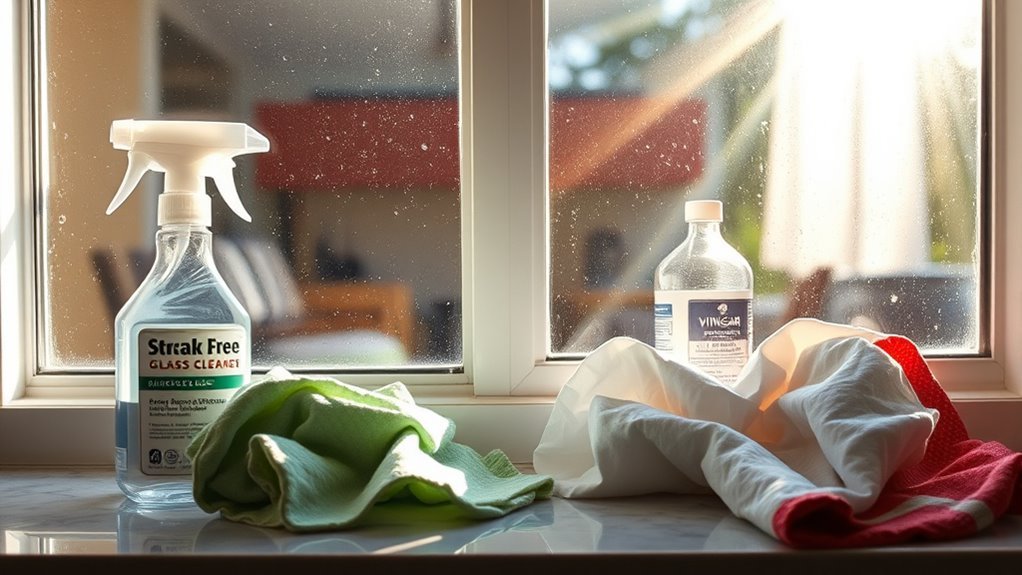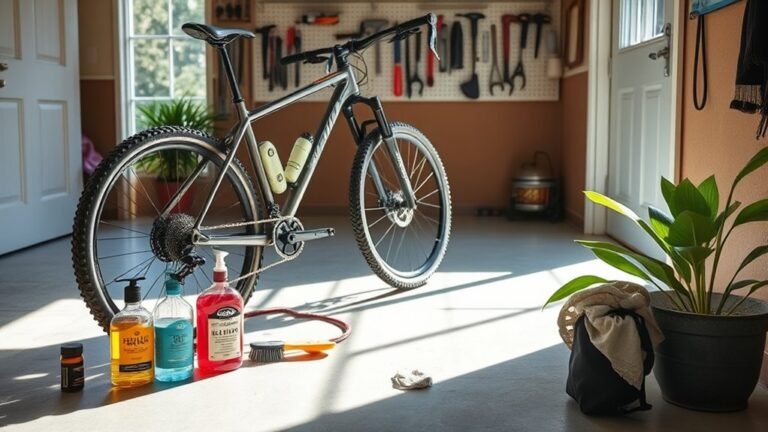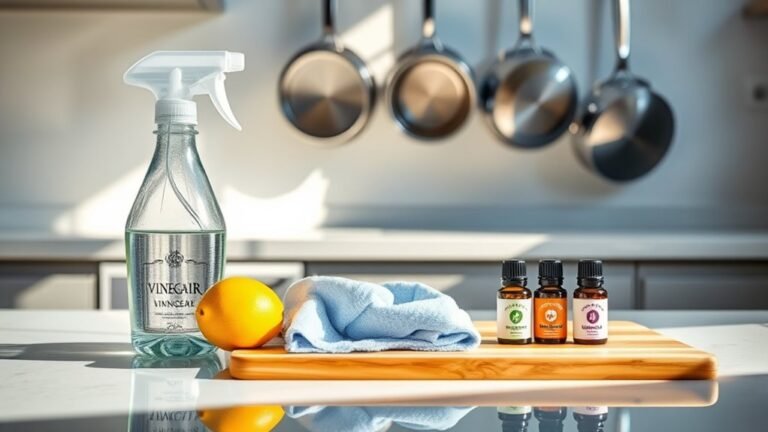Cleaning With Window: What Works and What Doesn’T
When cleaning your windows, you’ll want to use a good squeegee, microfiber cloths, and a simple solution like vinegar mixed with water and a bit of dish soap. Avoid paper towels and harsh chemicals that leave streaks or damage frames. Clean on calm, mild days to prevent dust and spots. Regular maintenance helps keep windows sparkling longer. Keep going, and you’ll discover tips to make your window cleaning easier and more effective.
Best Cleaning Solutions for Sparkling Windows
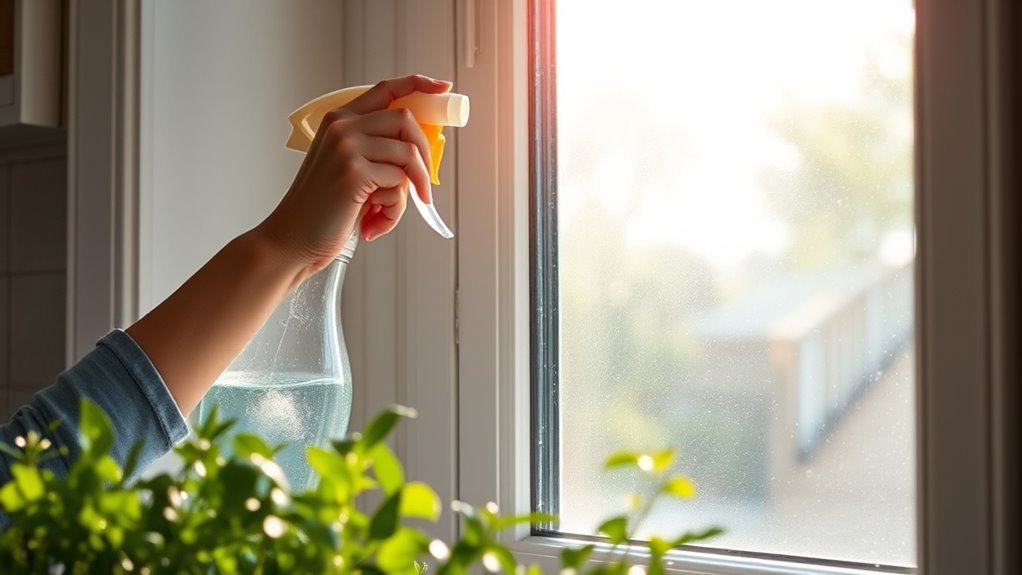
Although there are many products on the market, choosing the right cleaning solution is key to getting your windows sparkling without streaks. You want something effective but also aligned with your values—freedom from harsh chemicals and waste. Eco friendly solutions offer that liberation, letting you clean confidently without harming the environment or your health. Homemade cleaners, like a simple mix of vinegar, water, and a drop of dish soap, give you control over what touches your glass. They’re affordable, customizable, and easy to make anytime you want. By opting for these natural alternatives, you’re not just cleaning windows; you’re embracing a lifestyle that values simplicity, sustainability, and freedom from toxic residues. Your windows will shine, and you’ll feel good about how you made it happen.
Essential Tools for Effective Window Cleaning
Choosing the right cleaning solution sets the stage, but having the proper tools makes all the difference in getting your windows spotless. To truly free yourself from streaks and smudges, focus on these essentials:
- Squeegee types: Opt for a high-quality squeegee with a comfortable handle and replaceable rubber blades. Different sizes suit various window dimensions, giving you control and efficiency.
- Microfiber cloths: These are your best friends for wiping edges and polishing without scratching. They trap dirt and moisture better than cotton or paper towels.
- Bucket and scrubber: A sturdy bucket with a good scrubber head helps loosen dirt, making the cleaning process smoother.
Equip yourself with these tools, and you’ll enjoy the freedom of crystal-clear windows without the hassle.
Step-by-Step Guide to Streak-Free Window Washing
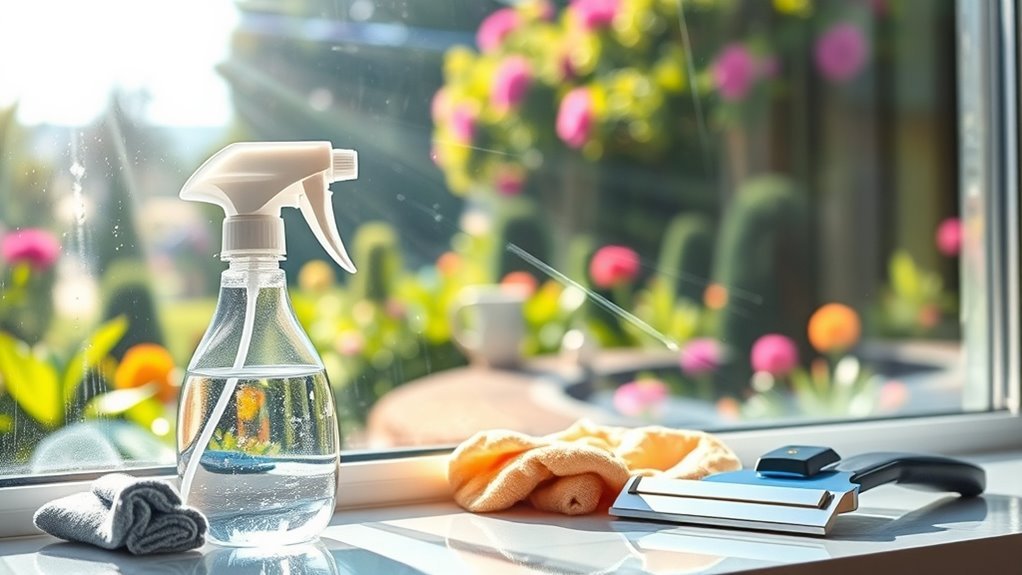
Once you’ve gathered your tools and cleaning solution, the best way to achieve streak-free windows is to follow a clear, methodical process. Start by removing dust with a dry cloth or brush to prevent grime buildup. Next, apply your cleaning solution evenly, choosing from technique variations like spraying or using a sponge, depending on your window type. Use a squeegee in smooth, overlapping strokes from top to bottom to avoid drips. Wipe edges and corners with a lint-free cloth to catch any remaining moisture. Remember, cleaning frequency matters; washing windows every few weeks keeps dirt at bay and maintains clarity. By sticking to this routine, you free yourself from stubborn streaks and enjoy sparkling, clear views without hassle or wasted effort.
Common Window Cleaning Mistakes to Avoid
When cleaning your windows, using the wrong tools can make the job harder and less effective. Don’t forget to clean the window frames, as dirt often builds up there and affects overall appearance. Also, skipping regular maintenance means grime will pile up, making future cleaning tougher.
Using Wrong Cleaning Tools
One of the biggest mistakes you can make is using the wrong tools to clean your windows. When you rely on improper equipment, you risk streaks, scratches, and wasted effort. To truly free yourself from frustration, focus on these essentials:
- Choose the right cleaning solutions—avoid harsh chemicals that can damage glass or frames.
- Use a squeegee designed for windows, not kitchen tools, to guarantee smooth, streak-free results.
- Opt for microfiber cloths instead of paper towels; they’re gentler and more effective at trapping dirt.
Ignoring Window Frames
While using the right tools is key to cleaning your windows effectively, many people overlook the frames altogether. Ignoring window frames is a common mistake that leads to frame neglect, allowing dust accumulation to build up unnoticed. If you want your windows to truly shine and feel fresh, you’ve got to treat the entire window, not just the glass. Frames collect dirt, grime, and allergens that can affect your indoor air quality and make your windows look dirty even after cleaning the glass. Take a few extra minutes to wipe down the frames with a damp cloth or mild cleaner. This simple step frees you from constant dirt buildup and keeps your windows looking spotless, giving you the freedom to enjoy clear views without compromise.
Skipping Regular Maintenance
If you neglect regular maintenance, your windows will quickly lose their sparkle and become harder to clean over time. Sticking to regular schedules isn’t just a chore — it’s a gateway to freedom from stubborn grime and costly repairs. Here’s why you shouldn’t skip it:
- Easier Cleaning: Frequent upkeep prevents buildup, making each cleaning quicker and less stressful.
- Extended Lifespan: Regular maintenance benefits your windows by protecting seals and preventing damage.
- Enhanced Appearance: Clean windows boost your home’s curb appeal and let in more natural light, freeing your space from gloom.
How Weather Conditions Affect Window Cleaning Results
Because weather can change so quickly, it’s important to contemplate conditions before you start cleaning your windows. Windy conditions can blow dust and debris back onto freshly cleaned glass, leaving streaks and forcing you to redo your work. Rainy days? They’re a no-go since water spots will ruin your efforts almost instantly. Temperature extremes also play a role; cleaning windows in scorching heat can cause cleaning solutions to dry too fast, creating streaks, while freezing temps might freeze your solution or make the glass brittle. Humidity levels affect drying time too—high humidity can slow drying, increasing streak risks, while low humidity helps windows dry quickly but can sometimes leave residue. So, pick calm, mild days to clean for the best, longest-lasting results.
Tips for Maintaining Clean Windows Longer
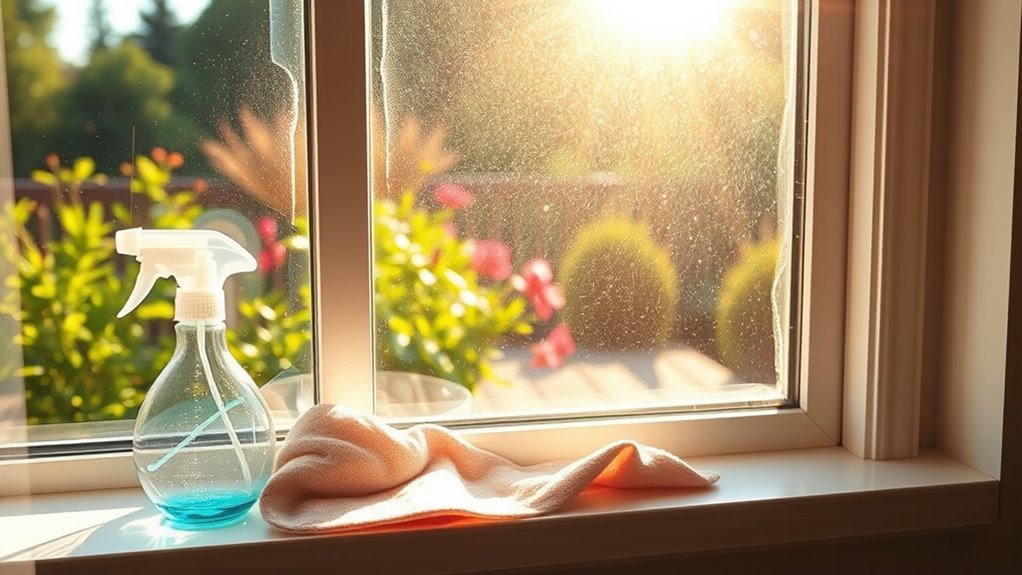
To keep your windows looking spotless for longer, you’ll want to adopt a few simple maintenance habits. Freedom means less hassle, so here’s how you can enjoy clear views without constant cleaning:
- Optimize window treatments: Choose blinds or shades that reduce dust buildup and block harsh sunlight, protecting your glass and cutting down on grime.
- Adjust cleaning frequency wisely: Clean your windows more often during pollen season or after storms, but less in dry, dust-free periods to save time.
- Spot clean regularly: Wipe smudges and water spots immediately to prevent stubborn stains, keeping your windows clearer between full cleanings.
Frequently Asked Questions
Can Cleaning Windows Improve Home Energy Efficiency?
When you keep your windows clean and well-maintained, you’re actually boosting window insulation, which helps keep your home’s temperature steady. This means less strain on your heating and cooling systems, leading to real energy savings. By improving insulation, you’re giving yourself the freedom to enjoy a comfy home without worrying about skyrocketing energy bills. It’s a simple step that makes a big difference in your energy efficiency and overall comfort.
Are There Eco-Friendly Window Cleaning Alternatives?
Ever wonder if you can clean your windows without harming the planet? You absolutely can! Using a vinegar solution made from natural ingredients like lemon juice and baking soda gives you a powerful eco-friendly alternative. It’s simple, effective, and frees you from harsh chemicals. By choosing these green options, you’re not just cleaning windows—you’re embracing a lifestyle that respects nature and your freedom to live sustainably.
How Often Should Window Screens Be Cleaned?
You should aim to clean your window screens at least twice a year as part of regular screen maintenance. Seasonal cleaning, like in spring and fall, helps keep them free from dust, pollen, and debris, ensuring fresh air flows through without hassle. If you live somewhere dusty or windy, you might want to clean them more often. Keeping up with this simple routine gives you the freedom to enjoy clear views and fresh air effortlessly.
Can Window Cleaning Damage Certain Types of Glass?
Oh sure, go ahead and scrub your delicate glass types like it’s a gladiator’s arena—who cares if you scratch or etch it, right? But seriously, not all cleaning methods suit every glass. Some fancy or coated glass can get damaged by harsh chemicals or abrasive tools, stripping away that freedom you wanted to enjoy. You’ve got to pick your battles wisely; gentle cleaners and soft cloths keep your windows—and your independence—intact.
Is Professional Window Cleaning Worth the Cost?
You might wonder if professional window cleaning is worth the cost. When you weigh the cost benefits, professional services save you time and effort, freeing you up for what you love. Experts use the right tools and techniques, ensuring your windows shine without damage, which can save money long-term. So, if you value your freedom and want streak-free results, investing in pros is often a smart choice.
